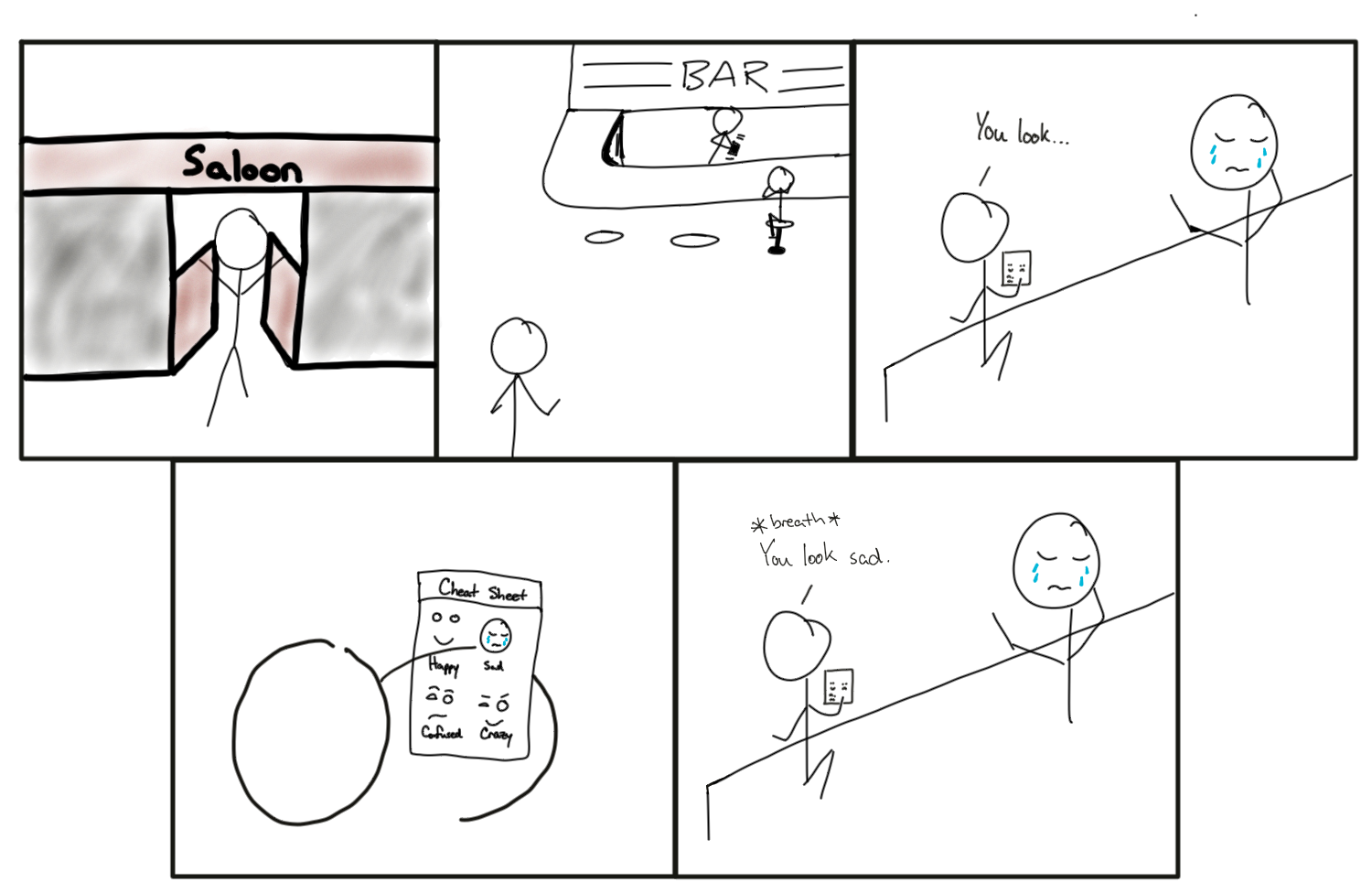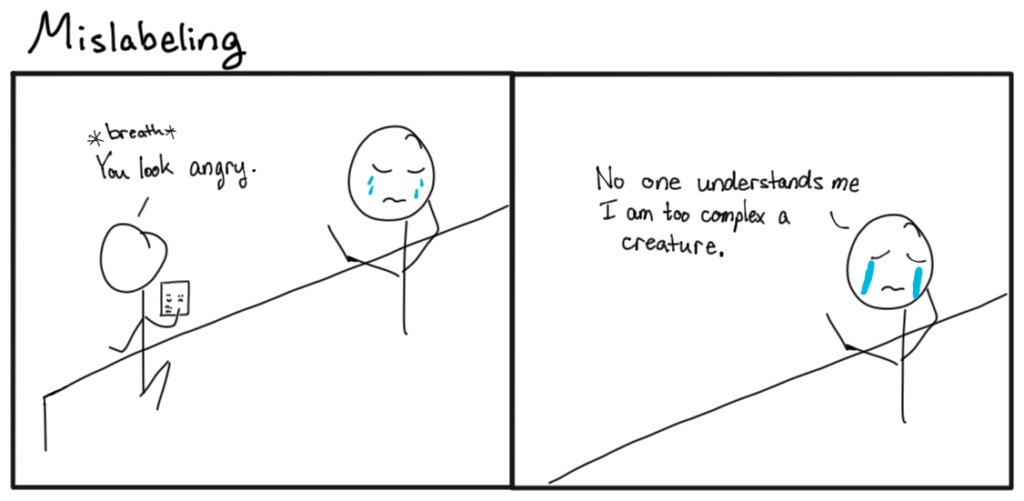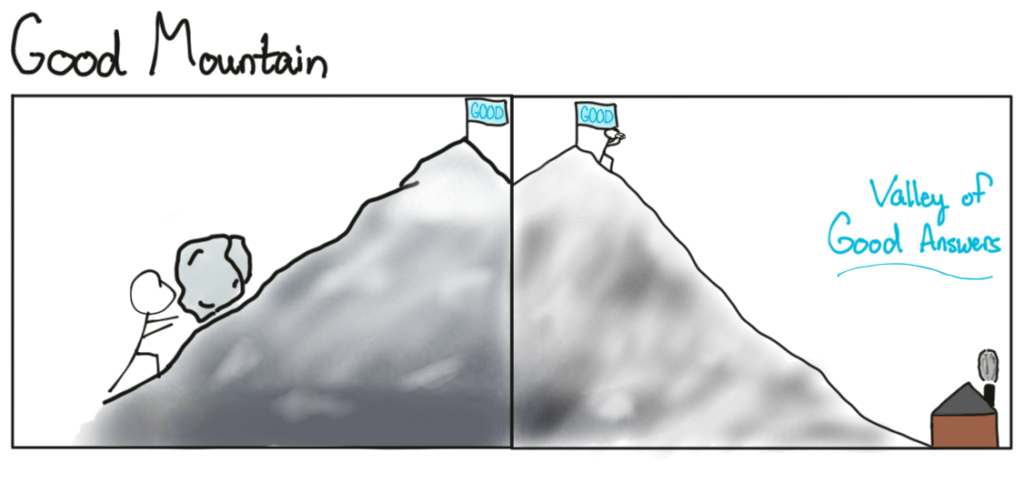🪄Keystones:
- Ask questions that are guesses. Learn to banter and improvise.
- Level 1-3 of questions: data collection, questions and banter as guesses, questions that bring out their emotions.
A Typical Conversation with a Dude

Now, personally, if ‘good’ isn’t enough, I also have nice, great, well, and fine at my disposal. To the frustration of those who ask how my day is—and who keep asking despite a low success rate—I almost always answer with “good.” Although this is not relationally helpful of me or of those who follow suit, I’ve rarely found “How are you?” to be an interesting question. So what questions might do the trick?
Disclaimer: Take my ramblings with a grain of salt and experiment with your own questions too. If you have any go-to questions that work, please share them below!
A Hierarchy of Questions
I propose that the questions people ask can be broken down like this:

Level 1: Data Collection Questions
In other words, small talk. Of course, you usually have to start at small talk to get to more interesting conversation but you don’t want to stay here long. The whole point of small talk is to get just enough information to move on to deeper questions. Some classic examples are:
Where are you from?
What are you doing here?
What is your favorite color?
How are you?
Level 2: Banter and Playful Guesses
Here you are going to try and take your level 1 questions, or what you already know about the person, to make an educated guess about them. Your guess could come from what they’re wearing, their face or body language, or perhaps what they are drinking. For example:
You: *notices their punk rock outfit* You must be an AC/DC fan, right?
You: *notices their hunched shoulders* Must have been a horrible week, eh?
You: *notices that they are on their fifth beer* Either you really, really like beer or you’re drowning your problems away…are you okay, man?
For those who are feeling extra spicy, just skip the level one stuff and go for that cold turkey guess. The guess can be about how you think they are feeling, what you think they did today, what you think their hobbies are, etc. Some phrasings to try: You look…, You sound…, You seem like a person who…, Are you a…

A good level 2 question/guess shows them that you noticed something about them. In doing so you communicate that you understand them or are, at least, trying to understand them better. Unless you are going for banter, make the guess with positive intent. You want the guess to be something they would feel flattered saying yes to.
You: *notices a man built like a brick house* For sure you’re a powerlifter, right?
Brick House: *chuckles* No, but I appreciate the compliment. I’ve just been really into lifting since…
Now you’re teasing out more of their life’s story and have more conversational threads to ask curious questions about. It all started with a flattering guess though!
Emotion Labeling:
One of the most powerful ways to show others that you are paying attention to them is to take a guess at how they are feeling. In Chris Voss’ book “Never Split the Difference” and in the FBI’s active listening handbook, this is known as emotion labeling. “You look sad, mad, angry, depressed, flustered, etc.” all suffice. What’s important is for your guess to be somewhat close to how they are actually feeling.

For the most part people will correct you if your emotional label is slightly off.
You: “You look frustrated, bro. Wassup?”
Them: “I’m not frustrated, just angry with my coworker.”
**use their emotional label.
You: “Oh, what’s got you angry with your coworker?”
Them: *Pours out the drama at work.
Whenever someone corrects the emotion label that you use, always switch to their label to describe how they are feeling (a slight caveat is when they’ve obviously mislabeled their emotion due to unpracticed self-awareness).
When your emotion label is far off, things don’t go as well. What you’ve done is show them that you don’t and aren’t close to understanding them.

Level 2’s with Close Friends:
If the person you’re talking with is a close friend, you can make more specific questions and guesses. Since you have more intimate knowledge about what projects they are working on, the tricky relationships they’re in, their hopes and dreams, etc., you can make better guesses.
Let me give an example with my brother. My brother is a firefighter, but I don’t understand much about the job other than thinking it’d be fun to ride in a fire truck with the lights on or wrangle the fire hose.
Plus, since I’m not a firefighter, he may not be interested in explaining the nuances of firefighting to me and the camaraderie of the team because that’s not something he may believe I can fully understand (the same sentiment can be felt by those in the military). So what might be a fun way to start a conversation with him? Well to find out about his week, I’d make a joke about what it might have consisted of: “How many grandma’s did you pick up this week?” (he once made a passing comment to me that there are a lot of elderly people who’ve fallen and can’t get back up).
From his answer, I should be able to pick out other details to make guesses or thoughtful questions around.
Level 3: Passions, People, and Projects
The golden level of questions. The friend that asks you fantastic, deep questions which make you feel heard and understood. Questions that you are excited or interested in answering.
Questions that make it to level three allow you to talk about your passions, people in your life, or a project you are working on.
A hidden gem of a level three question is to ask them for advice. It is extremely flattering and you feel important when someone asks for your thoughts. Benjamin Franklin summarizes it well, “The Fundamental rule for winning friends: appeal to their pride and vanity by constantly seeking their opinion and advice, and they will admire you for your judgment and wisdom.”
People like to explain their ideas and feel important. It feels great to helpful or useful to our friends. It’s a moment of validation in our worth within the friendship.
A Note About Project Questions to Men:
My brother first pointed this out to me from his marriage counseling but when it comes to project questions for men, there are two caveats to keep in mind:
- Unless you are someone who can help with the project, then usually they’re not interested in explaining it to you. They’d rather keep working on the problem themselves.
- If you are someone who can’t help them with the project, then they’ll usually only want to tell you about it once they’ve solved it.
- The caveat to the caveats: Sometimes with group projects, there’s a need for emotional processing or people problems to discuss. In those cases, I find for myself that I’m very open to discussing that aspect with anyone.
Getting past “Good” answers with Brute Force.
Some people believe that with enough effort and questions, they can make it to the other side of the relationship mountain…just go around the mountain.

A Variety of Questions is the Spice of Life
When it comes to someone whom you see every day, asking them the same “How are you?” can eventually become very boring so it needs variety to elicit a response. Some variations of the same might be:
- How are you doing?
- How have things been lately?
- How are you doing emotionally/physically/spiritually?
Hearing the same phrase over and over makes it an old question and doesn’t cause us any pause. Hearing a novel question catches our attention. This line of reasoning is also why age-old problems and ideas get a rebranding with each new generation of people. Idioms and metaphors must be updated to match the generation.
And remember, ask questions that you are curious about. This keeps the conversation interesting for both of you.
Your Next Experiments:
❗This next Tuesday try to ask at least one level two question. I would recommend trying out a cold turkey emotion label for starters. As you bump into people throughout the day, make a guess about how they are feeling.
- You look like you’re having a great day!
- You look like someone took your cookies out of the fridge.
- You’re looking super serious today.
❗On Wednesday, see how many questions it takes you to figure out what someone’s passions or hobbies are. If they are not clearly interested in talking your ear off, you may have a false peak. Ask more questions until you uncover their other hobbies.
8 responses to “How to Ask More Interesting Questions”
Dude…you are seriously thoughtful and insightful! This totally makes sense seeing it all in writing. I think the lightbulb 💡 💡 has turned on! 🎉🎉
The comics are golden 😂 This post gave me a good chuckle and some practical ideas that I can experiment with to improve conversations
Happy to hear you appreciated my doodles 🫶 I hope your experiments are going well!
Fantastic and insightful write-up! You’ve gotten at the art of conversation with a fresh perspective, and funny comics to boot. Would love to see a companion article on how to compliment people – without seeming like a sycophant or a creep – sometime in the future!
Even as a woman, I relate to this strategy. I think many people fall into level 1 just naturally, especially of their mental energy is low. I personally can only perform so much “level 1” before I need some more thoughtful or fun questions to keep me interested. This definitely gives me ideas on how to not fall into level 1 myself!
Awesome! How have your level 2’s been coming along lately?
I’m reading the book “Nonviolent Communication” by Marshall B. Rosenberg… He refers to his method/way as Nonviolent communication but I prefer his term compassionate communication. I would love to see a blog about your thoughts on this NVC process…. Ways to use this on a daily basis/reframing how we express ourselves and receiving it back in the same way from others. Are you up for the challenge???
Curious if you have thought through this?